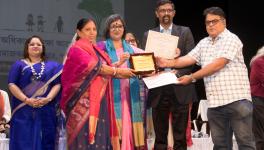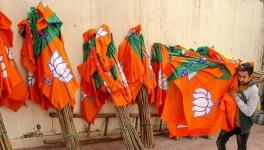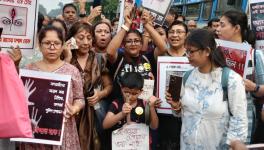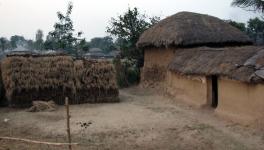Assam Polls: Discontent Brews in State’s Tea Gardens
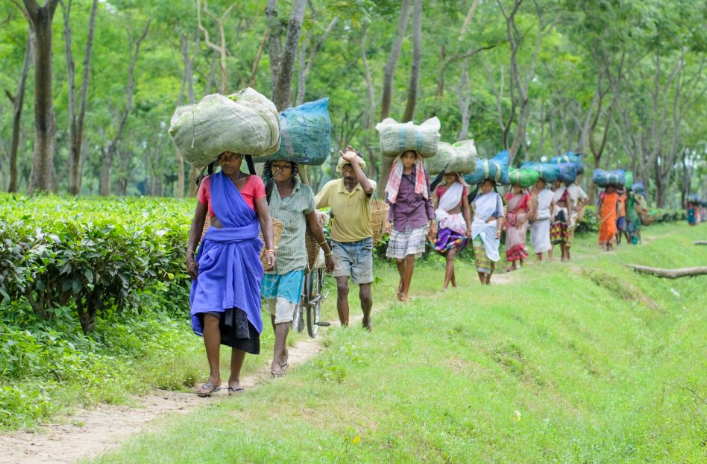
Speaking at a rally in poll-bound Assam’s Dhekiajuli on Sunday, Prime Minister Narendra Modi set the cat among the pigeons when he claimed that a foreign conspiracy had been hatched to tarnish the image of Indian tea.
While the PM did not name or identify the conspirators behind the alleged plot to defame Indian tea, his remarks were ostensibly a reference to the ‘toolkit’ shared by environmental activist Greta Thunberg. The toolkit in question was later deleted by Thunberg who subsequently put up an updated version. The first post with the toolkit which was deleted by Thunberg reportedly had a point that read “Disrupt yoga and chai image of India in general”.
“Documents have emerged to show that a conspiracy has been hatched outside the country to defame Indian tea. I am sure the tea workers of Assam will give a befitting reply. No tea garden worker in Assam can tolerate this attack and I am sure they will win this fight against these conspirators as they are stronger than these forces with vested interest,” PM Modi had said in Sunday’s rally.
To see Modi’s comment merely as a veiled jibe at celebrities like Thunberg and Rihanna, who expressed solidarity with the farmers’ protests in India will be missing the woods for the trees. The fact that the PM chose to make this ‘foreign conspiracy against Indian tea’ remark in Assam, a state which alone produces more than half of India’s tea is a clear indication of his and his party’s attempt to woo a key vote-bank of tea tribes, communities which had played a significant role in ensuring the saffron party’s maiden victory in the 2016 assembly elections in the state.
Tea Tribes: A Historical Overview
“Tea tribes” and “ex-tea tribes” – those who have moved out of the tea gardens to settle down in areas close to tea estates/gardens after their contract ends to pursue other professions like agriculture, who occasionally offer their services as casual labour – constitute about 20% of Assam’s total population. Considered to be one of the most backward communities of the state, the tea tribes are descendants of Adivasi communities like the Santhals, Mundas, Oraons, Gonds, etc.
This indentured ethnic section of Assam’s population was brought in for working on the tea gardens by British colonialists in the late 19th century from the neighbouring states of Jharkhand, Bihar, Odisha, Bengal and Andhra Pradesh. During this period, European powers like England, France, Spain, Netherlands and the US were engaged in an intensely fierce trade war over tea. Tea was the poor man’s dream and a status symbol for the uber rich.
Writing on the tea tribes of Assam for the Economic and Political Weekly, Indrajit Sharma noted:
“Assam was known for its tea industries, but plantation work needed significant human power. For this, the tea tribes were brought in as indentured labour from various provinces of India. During their tenure at the plantation work, the communities began to be identified as tea tribes. Today, they are mainly found in the districts of Darrang, Sonitpur, Nagaon, Jorhat, Golaghat, Dibrugarh, Cachar, Hailakandi, Karimganj, Tinsukia, and other districts of Assam. There are communities of tea tribes known as the “ex-tea garden tribes,” to refer to the members of the tea tribes who have settled down close to the tea estates in the state after the end of their contract and occasionally provide their services as casual labourers. The ex-tea garden tribes are mainly present in Kokrajhar in western Assam; Marigaon, Nagaon, Sonitpur, and Darrang in middle Assam; Golaghat, Jorhat, Sibsagar, Dibrugarh, and Tinsukia in upper Assam; North Cachar and Karbi Anglong in southern Assam; as well as the Barak Valley.”
A Potent Electoral Force in Assam
Plagued with exploitation, socio-economic backwardness, poor health conditions, low literacy rates and unkept poll promises, the numerically significant tribes can virtually swing the upcoming assembly elections in the state. The tea tribes can be the decisive factor in at least 40 to 45 seats across northern, central and upper Assam aside from the Barak Valley.
In the last two assembly elections in the state, the tea tribes have emerged as a potent electoral force. In 2011, the Congress, under the leadership of Tarun Gogoi, won a record third term despite facing heavy anti-incumbency owing to its impressive performance in the ‘Tea Belt’. The grand old party won 44 of the 56 seats in the Upper Assam region, an area dominated by the tea tribes. However, in 2016, as the Congress was decimated in the state, the BJP’s maiden victory was attributed to the overwhelming support it garnered from the tea tribes. A Lokniti post-poll survey finding added credence to the theory that the decline of the Congress was exacerbated by the tea tribes deserting the party. About 52% of the respondents in the survey were of the opinion that the condition of tea garden workers had deteriorated during the last five years of Tarun Gogoi’s rule.
Right from the first Lok Sabha election in 1952 the tea tribes were known to support and vote en bloc for the Congress. For decades the party won election after election in the state relying on its tried and tested formula of ‘Coolie-Bengali-Ali’. However, this formula failed miserably in the 2014 Lok Sabha Elections when the Coolies (the tea tribes/workers) walked away from the party for the first time and sided with the BJP. Consequently the tea garden-dotted seats of Dibrugarh, Jorhat and Tezpur were won by the saffron party. Using the familiar chaiwallah story to build an emotional connect with tea tribes, the Modi-led BJP had managed to woo the traditional Congress vote-bank. The PM and his party had also promised to fulfill two long-standing demands of the community, hiking minimum wages to Rs 351 and granting ST status to the tea tribes.
Six years later, nothing much has changed on the ground and the BJP is yet to deliver on its poll promises. The ST status demand is yet to be fulfilled and their wages continue to remain low at Rs 167 per day, a far cry from the Rs 351 which was promised and is being demanded. It is worth noting that tea workers in Assam get paid much less than their counterparts in Tamil Nadu, Kerala and even West Bengal.
With poll promises yet to be fulfilled, discontent is brewing in the tea gardens of Assam. On Sunday, even as the Prime Minister spoke about the conspiracy to defame Indian tea and devoted a large part of his address to the state's tea workers, he resorted to radio silence on their core issues and demands.
The Assam Tea Tribes Students Association (ATTSA) took to the streets, blocking highways, burning tires and effigies of the PM in tea gardens across the tea belt on the eve of the Prime Minister’s visit to protest against the failure of the government to hike daily minimum wages. Miffed over the Centre’s move to only consider 36 tea tribes for ST status, the organszing secretary of the ATTSA, Basanta Kurmi, was quoted saying by the TOI : “It is divisive politics. If they want to give us ST status, all 108 tea tribes should be included.”
In January, BJP President J.P. Nadda had faced flak for claiming that the Centre had granted ST status to six tribes at a time when consultations with stakeholders were still on. The latest update on the grant of ST status to the six communities – Koch Rajbongshi, Tai Ahom, Chutia, Matak, Moran and Tea Tribes – is that the issue is still pending. For the record, a Group of Ministers (GoM), constituted by the Sonowal government for preparing modalities to grant ST status, was reportedly yet to submit its final findings, which would then be sent to the central government.
Ahead of the assembly elections, the ruling BJP and the opposition, the Congress, are leaving no stone unturned to woo the tea tribes. While the Congress has upped the ante against the incumbent government for failing to fulfill the promise of ensuring minimum wages by organising sit-in protests and dharnas at the offices of Assistant Labour Commissioners across the state, the BJP is banking on a slew of welfare measures introduced by the Sonowal government for the tea tribes. Recently, it doled out cash to more than seven lakh tea plantation workers in the state. Finance Minister Nirmala Sitharaman presided over ‘Cha Bagichhar Dhan Puraskar Mela’ where Rs 3,000 each was transferred to over 7 lakh accounts.
“The tea workers now enjoy digital facilities like anyone in the metros like Mumbai, Delhi, Chennai does. You are directly getting money. There are no middlemen. This is the benefit of digitalisation,” she said, adding that the initiatives of the BJP governments at the Centre and in the State had led to the opening of bank accounts, mobile banking, and installation of ATMs in tea gardens.
“Assam tea has a global brand value. We all have tea in the morning, but your children eat stale rice. This situation has to change. The children of the workers, who provide tea to the world, must have access to fresh food,” she added.
At the same event, Assam Finance Minister and BJP’s go-to man in the North-East, Himanta Biswa Sarma, announced that the state government will issue a notification to hike the daily wages of the tea workers.
On Thursday, Union Home Minister Amit Shah visited the residence of Ananta Rai, the self proclaimed king of Cooch Behar who also is believed to command substantial clout over the Koch-Rajbongshi community, one of the communities which demanding ST status. After the visit, hinting at the possibility of the government granting ST status, Rai said that ‘good news’ was on the way for Rajbongshis. The community and its vote is vital to the BJP not just in Assam but also in the northern part of West Bengal.
With poll promises yet to be fulfilled and state all set to witness a three cornered fight among the Congress’ grand alliance, the NDA and the regional front comprising the Rajor Dal and Asom Jatiya Parishad, it is not just tea but also discontent that is brewing in the tea gardens of Assam.
The author is a freelancer based in Bombay and an alumnus of Mumbai’s St. Xavier’s College. His interests vary from politics, psephology, and journalism to regional Indian cinema. He tweets @Omkarismunlimit
Get the latest reports & analysis with people's perspective on Protests, movements & deep analytical videos, discussions of the current affairs in your Telegram app. Subscribe to NewsClick's Telegram channel & get Real-Time updates on stories, as they get published on our website.










